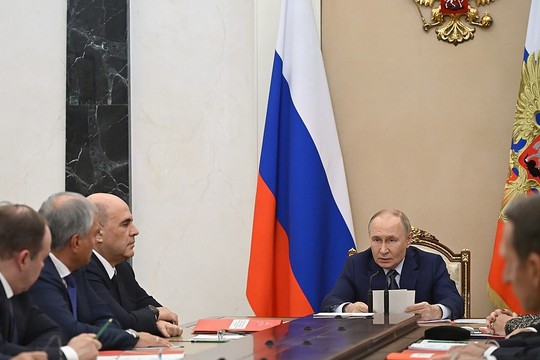Photo: Kremlin.ru
Meeting with permanent members of the Security Council.
September 22, 2025
The Kremlin, Moscow
The meeting was attended by Prime Minister Mikhail Mishustin, Federation Council Speaker Valentina Matviyenko, State Duma Speaker Vyacheslav Volodin, Deputy Chairman of the Security Council Dmitry Medvedev, Chief of Staff of the Presidential Executive Office Anton Vaino, Security Council Secretary Sergei Shoigu, Defence Minister Andrei Belousov, Foreign Minister Sergei Lavrov, Director of the Federal Security Service Alexander Bortnikov, Director of the Foreign Intelligence Service Sergei Naryshkin, and Special Presidential Representative for Environmental Protection, Ecology and Transport Sergei Ivanov, Kremlin informs.
* * *
President of Russia Vladimir Putin:
Good afternoon, colleagues,
We have several topics to discuss today, including matters related to migration policy. However, I would like to begin with an issue of prime importance, one that is critical to safeguarding our national interests, Russia’s sovereignty, and, without exaggeration, international security as a whole. I am referring to the situation in the realm of strategic stability, which, regrettably, continues to deteriorate. This is driven by a combination of factors, which are negative, compounding existing strategic risks and generating new ones.
As a result of the destructive actions previously taken by Western countries, the foundations of constructive relations and practical cooperation between nuclear powers have been significantly undermined. The basis for dialogue within relevant bilateral and multilateral frameworks has been eroded. Gradually, the system of Soviet-American and Russian-American agreements on nuclear missile and strategic defence arms control – long relied upon to stabilise relations between the two largest nuclear powers and to enhance global security – has been nearly dismantled.
Let me reiterate: we have repeatedly examined the causes and potential consequences of this situation. We attribute the numerous challenges that have accumulated in the strategic sphere since the beginning of the 21st century to the destructive actions of the West, their destabilising doctrines and military-technical programmes designed to undermine global parity and pursue absolute, overwhelming superiority.
We have consistently and thoroughly addressed these issues, criticised this approach, and not only highlighted the extreme dangers of further deterioration but also repeatedly proposed concrete ideas for joint solutions. However, our warnings and initiatives have not received a clear response.
Let me emphasise and let there be no doubt: Russia is fully capable of responding to any current or emerging threat, not with words, but through concrete military-technical measures. A clear example is our decision to end the unilateral moratorium on the deployment of ground-based short- and intermediate-range missiles. This was a forced move needed for ensuring an adequate response to the deployment of similar US and other Western-made weapons in Europe and the Asia-Pacific region, which poses a direct threat to Russia’s security.
Our plans to strengthen the country’s defence capability are being developed with full regard to the evolving international situation, and they are being implemented in a comprehensive and timely manner. We are confident in the reliability and effectiveness of our national deterrent forces. At the same time, we are not seeking to further escalate tensions or fuel an arms race. Russia has consistently upheld the primacy of political and diplomatic methods for maintaining global peace, based on the principles of equality, the indivisibility of security, and mutual respect for interests.
Let me remind you that the last major political and diplomatic achievement in the field of strategic stability was the conclusion of the Russian-American New Strategic Arms Reduction Treaty (New START) in 2010. However, owing to the profoundly hostile policies of the Biden administration, which undermined the fundamental principles on which this treaty was built, its full implementation was suspended in 2023.
Nevertheless, both parties have declared their intention to continue voluntarily observing the central quantitative limits of the strategic offensive arms treaty until its expiry.
For nearly 15 years, this agreement has played a constructive role in maintaining balance and predictability in the sphere of strategic offensive weapons.
The New START Treaty will expire on February 5, 2026, signalling the imminent end of the last international accord directly limiting nuclear missile capabilities. A complete renunciation of this treaty’s legacy would, from many points, be a grave and short-sighted mistake. It would also have adverse implications for the objectives of the Treaty on the Non-Proliferation of Nuclear Weapons.
In order to prevent the emergence of a new strategic arms race and to preserve an acceptable degree of predictability and restraint, we consider it reasonable to maintain at this turbulent time the status quo established under New START. Accordingly, Russia is prepared to continue observing the treaty’s central quantitative restrictions for one year after February 5, 2026.
Following that date, based on a careful assessment of the situation, we will make a definite decision on whether to uphold these voluntary self-limitations. We believe that this measure is only feasible if the United States acts in a similar spirit and refrains from steps that would undermine or disrupt the existing balance of deterrence.
In this connection, I would like to ask the relevant agencies to maintain close oversight of American activities related to the START arsenal in the first place. Particular attention must be directed towards US plans to expand strategic components of its missile defence system, including preparations for the deployment of interceptors in outer space. We believe that the practical implementation of such destabilising measures could nullify our efforts to maintain the status quo in the field of strategic offensive arms. We will respond appropriately in this case.
I believe that Russia’s initiative, if implemented, could make a substantial contribution to creating the conditions necessary for a substantive strategic dialogue with the United States – provided, of course, that the grounds for its full resumption are secured and that broader steps are taken to normalise bilateral relations and remove core security contradictions.
Let us now turn to the current agenda. Sergei Lavrov and Andrei Belousov will take the floor.
read more in our Telegram-channel https://t.me/The_International_Affairs

 19:10 22.09.2025 •
19:10 22.09.2025 •























